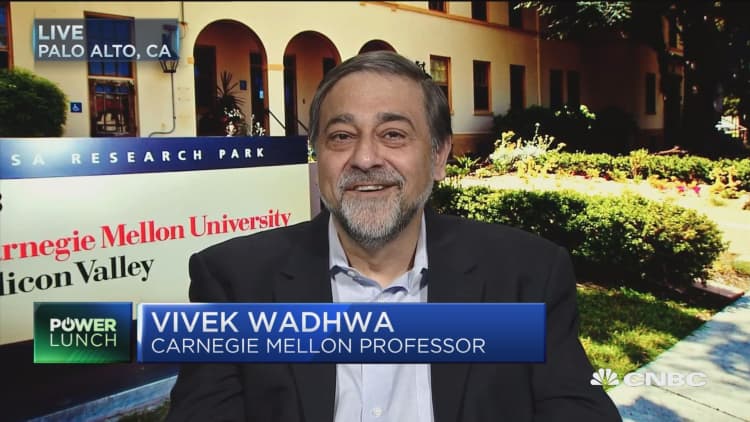
An immigrant tech entrepreneur said president-elect Donald Trump's visa policy may actually be right for Silicon Valley.
"It's hard for me to say anything good about Donald Trump, but this may actually be a good change that he's making," said Vivek Wadhwa, an adjunct professor at Carnegie Mellon University and a director of research at Duke University.
Wadhwa's been critical of the Republican party under Trump, tweeting that it was being "ripped apart by protectionism." Wadhwa's book, "The Immigrant Exodus: Why America Is Losing the Global Race to Capture Entrepreneurial Talent," finds that U.S. policies are forcing immigrants to "take innovation elsewhere."
Those sentiments are shared by Silicon Valley leaders such as Alphabet Executive Chairman Eric Schmidt.
Schmidt said in the fall the tech sector's day-one ask of Trump is H-1B visa reform, such as expanding the number of visas available. Google has brilliant engineers in Canadian condos waiting to work, and Schmidt said he fears "they go and build competitors to our companies."
Trump, though, has promised a hard line on immigration, proposing a crack down on illegal immigration and restrictions on immigration from areas with high levels of terrorism. Sources told Reuters this week that Trump's transition team has been proposed "scrapping the existing lottery system" and replacing it to favor visa petitions for jobs that pay the highest salaries.
Rather than expanding the cap, Wadhwa said that Trump could clamp down on top visa holders Cognizant Tech Solutions and Infosys, which Wadhwa calls "outsourcing firms."
"The visa is abused. Right now, you have these outsourcing companies taking all the visas, which means Silicon Valley starves for visas," told CNBC's "Power Lunch" on Friday. "What this will do is to shift the balance in the favor of the Valley, and allow tech companies that pay the highest for any given wage level to hire the recruits."
Trump has wavered on the high-skilled, or H-1B immigration, saying on his campaign website that America should "choose immigrants based on merit, skill and proficiency," but removing a passage that said prioritizing domestic workers will improve the number of black, Hispanic and female workers in Silicon Valley.
U.S. employers can grant a total of 65,000 H-1B visas annually to workers like scientists, engineers or computer programmers, with some exceptions for those employed at nonprofits, government or higher education, according to the U.S. Department of Homeland Security website. Applicants must have an advanced degree in their field, and the extensive applications cost employers and immigrants several hundred dollars.
Some research shows that H-1B holders actually earn more than their domestic counterparts — but about 25 percent are granted for occupations that typically require only an associate's degree, according to think tank Brookings Institution. More recent research, though, suggests the program is used to cut labor costs, according to the Economic Policy Institute.
"Let wages rise, and let the best from all over the world compete with the best in America," Wadhwa said. "This is what makes America great."
More: What Trump means for the future of tech's H1B visas



